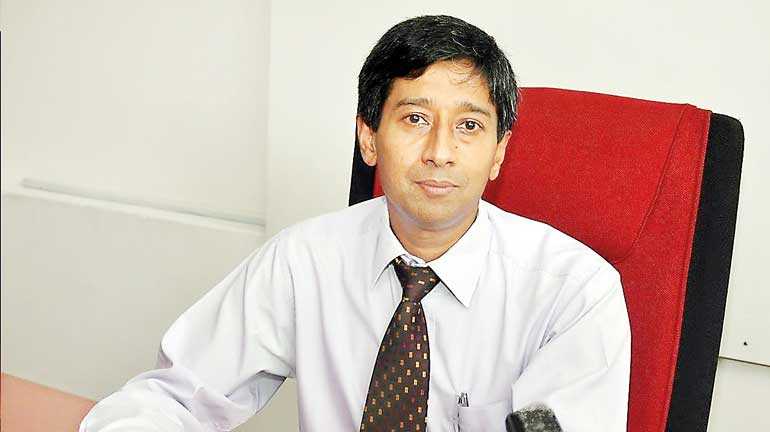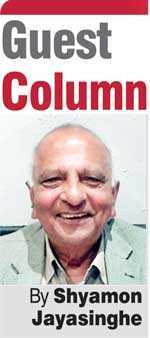Friday Feb 20, 2026
Friday Feb 20, 2026
Tuesday, 21 August 2018 00:00 - - {{hitsCtrl.values.hits}}
 GMOA President Dr. Anuruddha Padeniya
GMOA President Dr. Anuruddha Padeniya
Cause for excitement
I am excited! A way of identifying and measuring a traitor is soon to be unveiled; by no less than the President of the GMOA! Hasn’t he also qualified in some department of neurology? All the more reason to justify my excitement! If the good doctor does a serious job of that… off he goes to collect a Nobel Prize. Who doesn’t need that finding? Who will grudge that award?
“We have created a point scheme,” Dr. Anuruddha Padeniya, President of the striking-prone GMOA, reportedly told a Lake House journalist. “In psychiatry there is a method to identify people who betray the country. We are going to launch this list and keep it online with the materials you publish. So we can display that you are carrying out a contract.”
Several scenarios
Dr. Padeniya refers to an act of betrayal of a country. On the other hand, a traitor is a general term used to describe an individual who betrays not only his country. The betrayal can be of one’s group, of another person, or even a principle or cause. When Brutus turned on his friend Julius Caesar, he became a famous example of a traitor. Treason is the related legal crime that such behaviour represents.
The term traitor can thus represent different scenarios. In early childhood we are supposed to have a betrayal disposition in the Oedipus complex. As a matter of fact, you and I and even Padeniya has embedded in us some proclivity to betray in some context. The motivations can be money, ego or ideology and throughout our lives we suffer from such internal tension.
As a schoolboy we may betray another schoolboy in order to gain the good books of the Principal or teacher. As a politically participating adult there have been incidents where individuals have betrayed their party either because they feel they have been ignored and their self-esteem thus injured. Sri Lanka’s own political history is replete with such betrayals.
Often the ego factor is boosted by a money offer or the offer of a portfolio. These and others form a myriad of scenarios that reflect the act of betrayal and treachery. Thus the betrayal of one’s country seems to be an extension of an instinctual tendency.
“Traitor,” in ordinary discourse
In ordinary chatting, we name someone a traitor if his actions can be tantamount to a betrayal of a group, another person, country, ideology or cause. The assumption is that he is pre-committed to such a group or country or cause and now he goes and betrays.
Army personal giving intelligence to the enemy is a plain act of treachery. A pre-committed socialist espousing liberal capitalism ideology is another. In such instances, we judge the actions of a member of the group or cause from the perspective of the goals of such group or cause. The adjective ‘traitor,’ in all such instances follow consequentially from the definition of goals and aims of the group, country or cause.
It is not that there aren’t possible complications of interpretation with regard to violations in all the above examples. One can cite many, for instance, of alleged treachery to a country by a citizen, or ideology by a proponent.
As an illustration, in the kinds of concerns the GMOA is known to have with regard to Government policy, international trade agreements take foremost priority. GMOA may believe only a traitor can support trade agreements. On the other hand, a proponent of trade agreements may genuinely believe in the long-term benefits that flow to the country from such agreements. Economists themselves can disagree among each other. The question is, are these alleged acts of terrorism actually so? Certainly no.
It may even be alleged that Dr Padeniya is a traitor to the country by organising serial strikes causing untold hardships to the suffering community of patients.
All these considerations explain why the act of branding a person as traitor following the consequences of that persons actions is in difficult territory.
The psychiatrist perspective
The Padeniya point scheme is, evidently, not meant to identify and measure a traitor on the basis of the latter’s actions as explained in the above account. One doesn’t need a psychiatric study for that; only an assessment with regard to actions of an individual in relation to a country’s vital needs.
On the other hand, what the doctor wants us to believe is that the science of psychiatry has devised ways of recognising a terrorist by examining the alleged offender’s mindset or mind process. The alleged act of being a traitor here is not by the comparing consequences of action along with the assumed or explicitly stated definition of a traitor.
Padeniya believes that one can delve into a person’s mind and figure out traces of being a potential traitor and determine the quantum and strength of such traces. He means to be able to identify the psychic tendency for a person to betray. It would be a wonderfully useful tool for all of us because theoretically you and I can then decide whom to trust and whom not to trust.
Good news for authoritarian rulers
This is wonderful news for authoritarian rulers like Turkey’s Erdogan, Cambodia’s Hun Sen and to the “dear leader,” North Korea’s Kim Jong. If Sri Lanka, too, is going to have such a strongman in the personality of Gotabaya as wished for by the Malwatte Upa Nayake monk, then this Padeniya point scheme would ensure that the right traitor will be picked and taken away in the night in a white van well before any damage could be done to “the country”.
Looking back to some decades, Sri Lankans still mourn the liquidation of Richard Soyza. The simple reason is that Richard wasn’t a traitor. He was an eminently cultured and talented persona and an independent thinker who wrote for human rights. The same with the more recent case of Lasantha Wickrematunge, Editor of The Sunday Leader, who merely exercised the media right of exposure of ministerial fraud in the public interest. Richard and Lasantha were perfect Sri Lankans who loved their country, as you or I do.
Hard to access the dark recesses of the human mind
Marlene Behrmann, a professor of cognitive neuroscience at Carnegie Mellon University, agrees that “despite decades and decades of research we still have only a rudimentary understanding about brain function”. Scientists know a great deal about other organs like the liver and kidney; of the working of the brain and functioning of the mind, very little.
It is hard to see how such a check list of the type promised by Dr. Anuruddha Padeniya can be objective. We have heard of objective signs of a person who is lying while giving testimony. Lie detectors have been accordingly manufactured and are used for such a purpose. The following eight habits have been regarded as “sure signs”:
1. They cover their mouths
2. They repeat themselves and provide too much detail
3. They prepare for an escape
4. Their words and body language don’t match
5. Their breathing changes
6. They change their typical patterns of eye movement
7. They get aggressive
8. They fidget
Doubtless even this scheme is plagued with practical difficulties and controversies. Besides this, the identification here also takes place while the act is on; not preceding the act by way of examining potentiality to lie.
How then can one figure out the Padeniya scheme of picking potential betrayers beforehand? How objective can that attempt ever be? One can cite some of the many issues that arise.
Research on treason
Humberto Nagera, MD in his essay, ‘Conflict, Treason and Terrorism. An Attempt at Psychoanalytic Understanding,’ asserts:
“The subject of treason has received very scanty treatment in the psychoanalytic literature. Perhaps one of the reasons is that there is in each one of us, at the very least, a “minor traitor”, a fact that we cannot but contemplate with some horror, fear and shame.”
A paper by James Alexander (1969) which deals briefly with the issues of dissent, and particularly treason and sedition as the more destructive forms of dissent. Alexander concluded that: “Intra-psychically treason or strong treasonable and seditious potentialities implicate large areas of the total personality and the character structure of the individual in a pathological process.” As he sees it: “The primary structural sites of these pathological processes are defects in the super-ego and ego-ideal.”
The human is an intrinsically selfish species and the offer of money and position can move us stealthily to the other side. Sri Lankans have had an abandon number of example of political treachery. Now, my question is could not Dr. Padeniya’s point scheme get conflated with these natural human instincts? In such event what usefulness would the point scheme have?
Secondly, given that a person has been clearly spotted as a potential betrayer how can one predict that such a suspect will ever carry out an act of betrayal? If one is unlikely to carry out such an act then what is the value of measuring persons prone to treachery? Also, how do we know to what a dangerous extent a person would be prepared to betray?
Conclusion
It is possible for me to go on and on showing up methodological difficulties I have encountered in my reading about the psychology of treason some of the numerous difficulties one faces in trying to identify a traitor. For the general reader what has been written should suffice to make him wonder what kind of output Dr. Anuruddha Padeniya is going to come out with. We are in a most complex field. To view the scene as anything but complex is the art of the simple mind
Yes, we are all excited, doctor.
(The writer can be reached via [email protected])